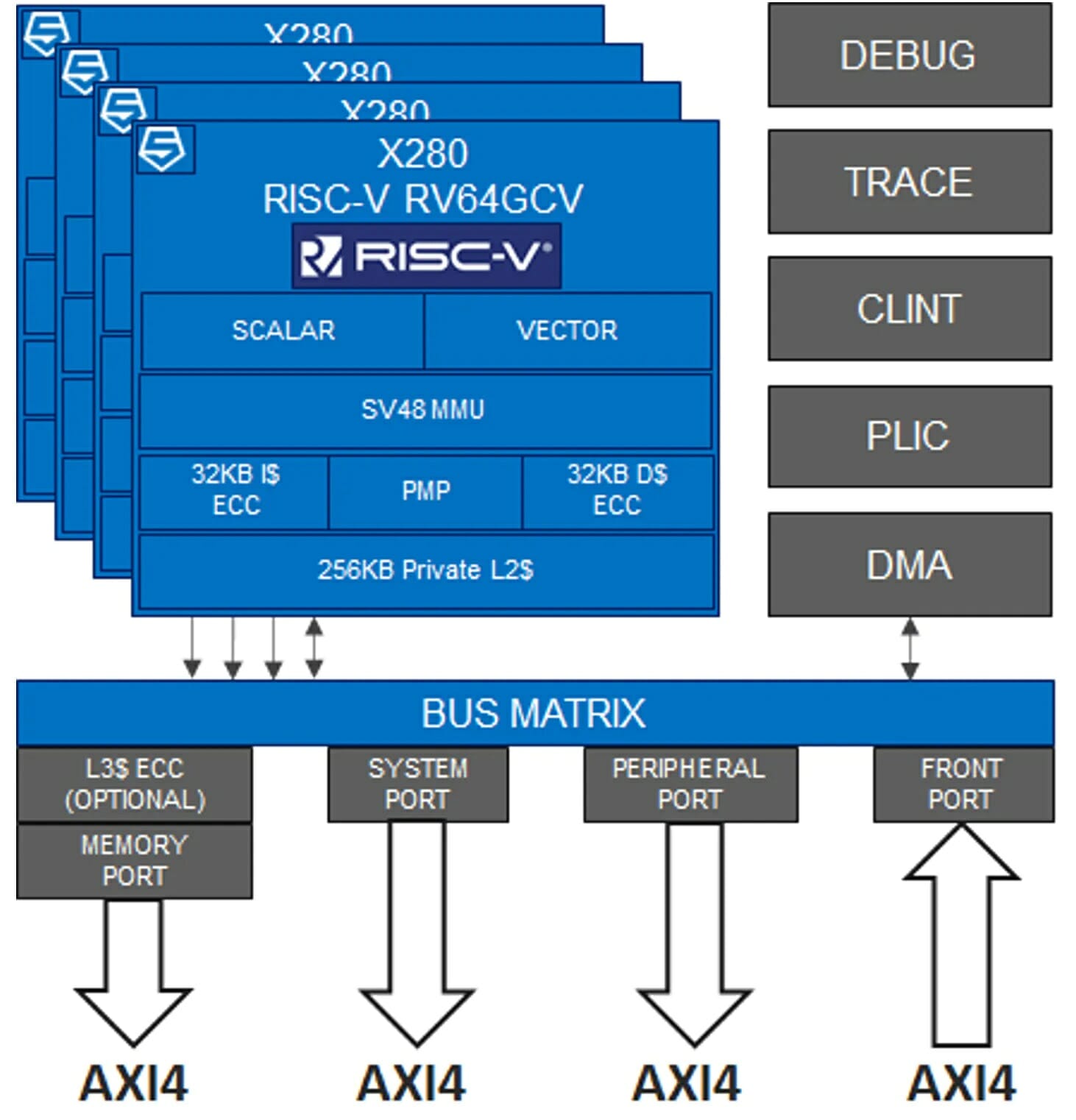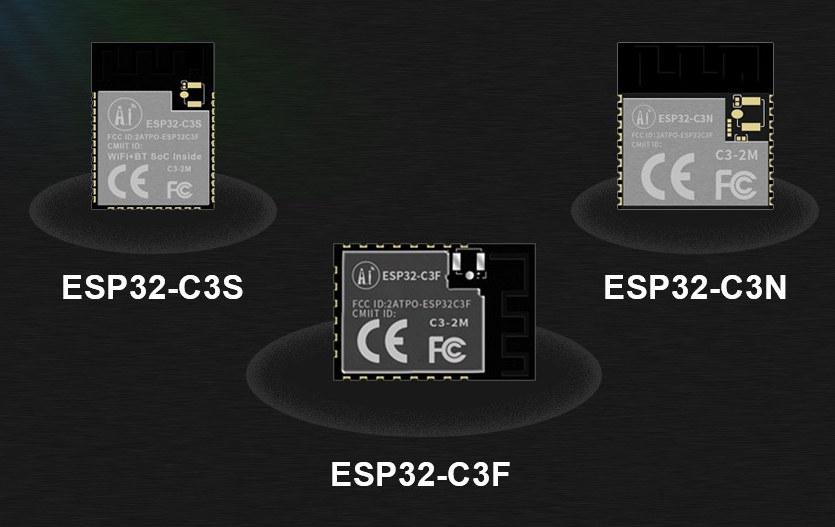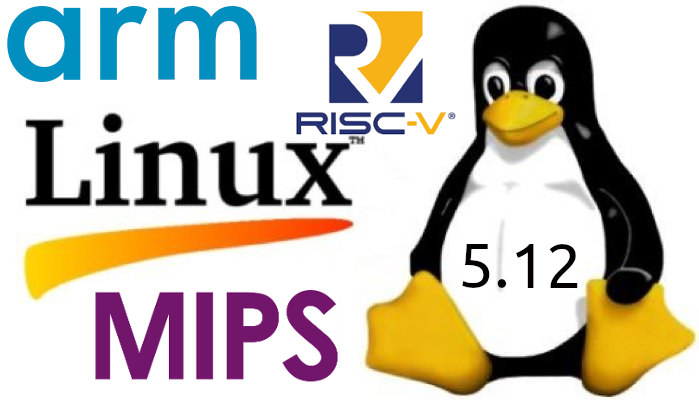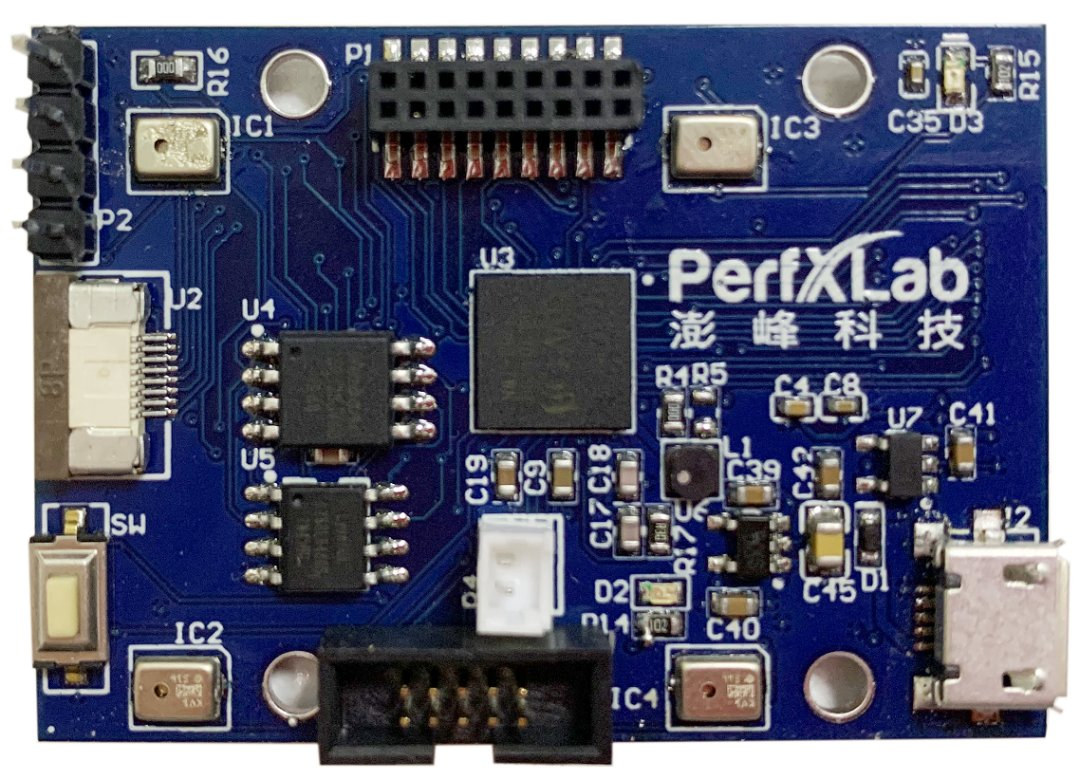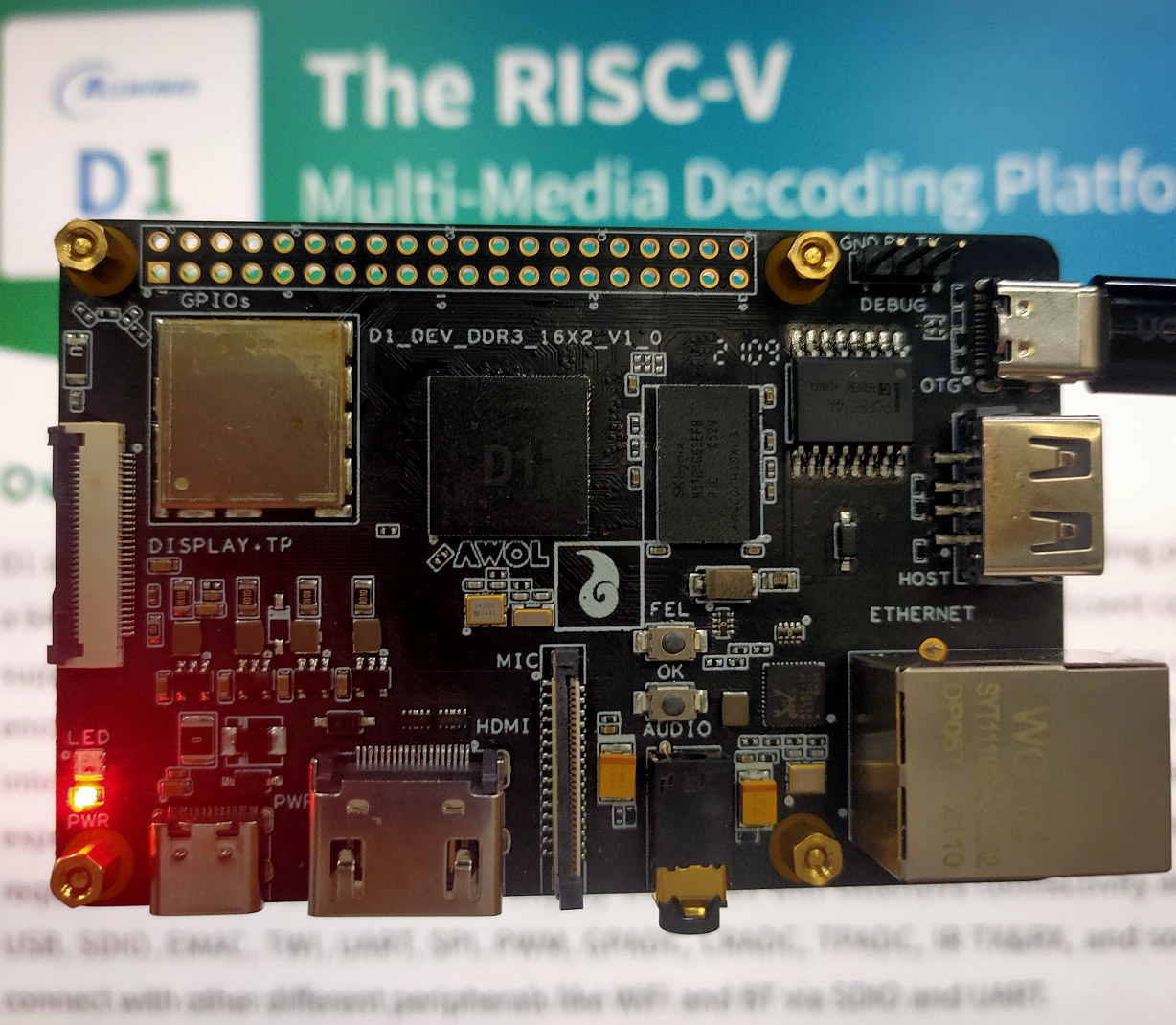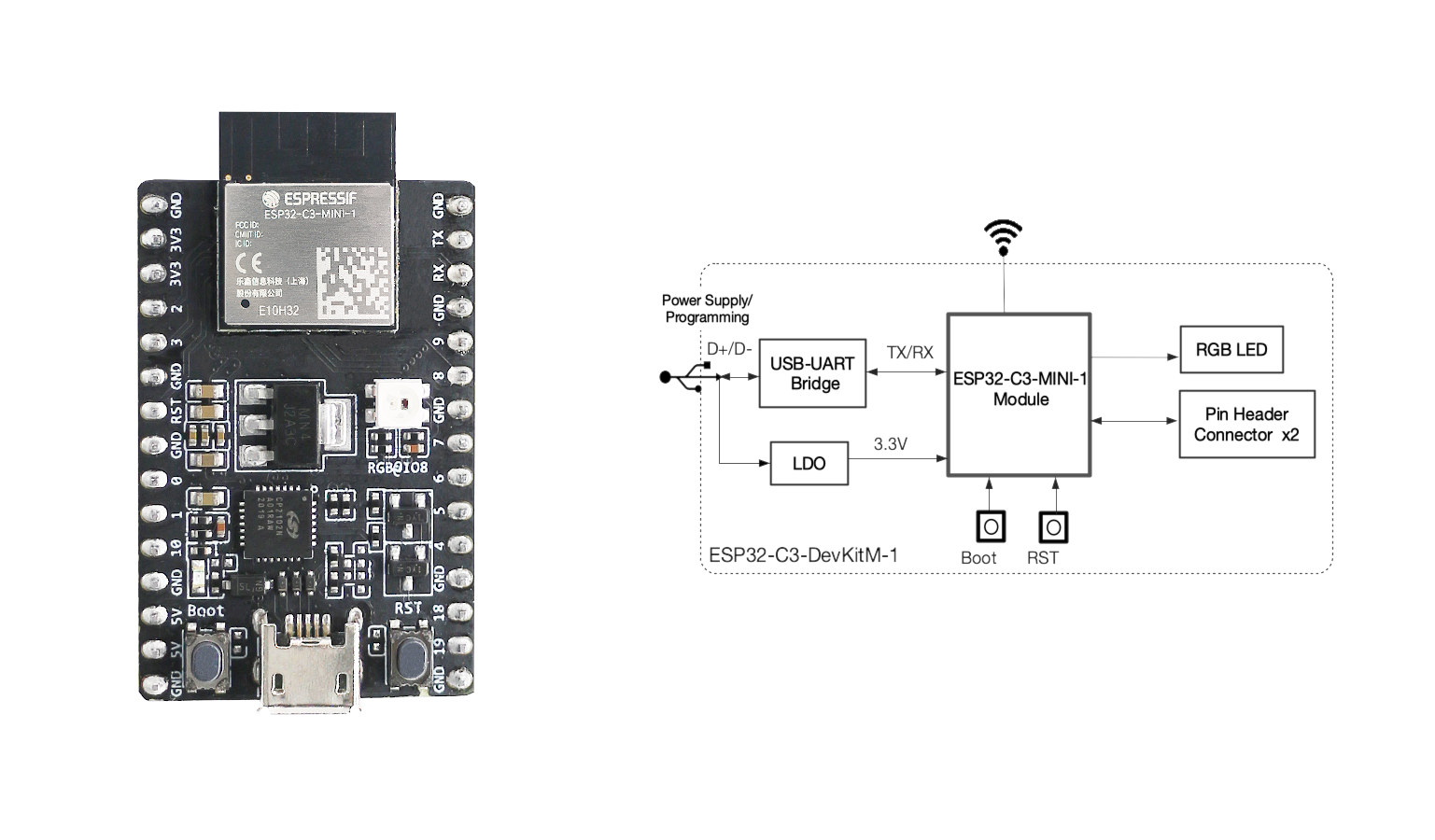The last RISC-V core announced by SiFive was the U8-Series out-of-order RISC-V Core IP that aims to compete against Arm Cortex-A72 Core. But in their latest announcement, the company built upon the 64-bit RISC-V U7-series with the SiFive Intelligence X280 multi-core, Linux capable RISC-V processor adding vector extensions and SiFive Intelligence Extensions, and optimized for AI/ML compute at the edge. SiFive Intelligence X280 key features: 64-bit RISC-V ISA with 8-stage dual-issue in-order pipeline, coherent multi-core, Linux capable based on U7 series core. SiFive Intelligence Extensions for ML workloads – BF16/FP16/FP32/FP64, int8 to 64 fixed-point data types 512-bit vector register length – Variable-length operations, up to 512-bits of data per cycle High-performance vector memory subsystem Memory parallelism provides cache miss tolerance Virtual memory support with precise exceptions Up to 48-bit addressing SiFive Intelligence includes software solutions to leverage the X280’s features and provide “great AI inference performance” using TensorFlow Lite. No […]
AI-Thinker introduces 5 ESP32-C3 modules pin compatible with ESP8266 & ESP32 modules
ESP32-C3 is the first RISC-V wireless SoC from Espressif Systems, and at the time of the initial announcement promised to cost about the same as ESP8266 but adds support for Bluetooth 5.0 LE besides 2.4 GHz WiFi, and retain software compatibility through the ESP-IDF framework. We were also told the goal was to provide ESP8266 compatible modules, and AI-Thinker has just announced five new ESP32-C3 modules compatible with earlier ESP8266 & ESP32 modules as shown in the table below. The table above is quite low resolution but that’s the best I could obtain from the company… It’s also a complete mess, not showing all alternative ESP8266 or mistaken in board sizes. So I’ll try to give a short summary of differentiating features and equivalent ESP8266/ESP32 modules: ESP32-C3F is meant to replace ESP-12F with a 24 x 16 mm form factor. It does add an IPEX connector, besides the PCB antenna. […]
Linux 5.12 – Main Changes, Arm, MIPS and RISC-V Architectures
Linux 5.12 release was expected last Sunday, but Linus Torvalds decided to release one more release candidate, namely Linux 5.12-RC8, to “make sure things are all settled down“, so the latest Linux kernel is now expected this weekend. Tihs should not yield any significant changes, so we can check what’s new in Linux 5.12, notably with regards to Arm, MIPS, and RISC-V architectures often used in SoC’s found in embedded systems. Around two months ago, the release of Linux 5.11 added support for Intel’s software guard extensions (SGX) and Platform Monitoring Technology (PMT), AMD “Van Gogh” and “Dimgrey cavefish” graphics processors, MIPI I3C host controller interfaces, and much more. Some interesting changes in Linux 5.12 include: Added support for ACRN hypervisor designed for IoT & embedded devices Added support for Playstation DualSense & Nintendo 64 game controllers, as well as Nintendo 64 data cartridges Dynamic thermal power management via a […]
Perf-V Beetle board features GAP8 multi-core RISC-V AI MCU
GreenWaves Technologies introduced the GAP8 low-power RISC-V IoT processor optimized for artificial intelligence applications in 2018. The multi-core (8+1) RISC-V processor is especially suitable for image and audio algorithms including convolutional neural network (CNN) inference. The same year, the company launched the GAPUINO development kit that sold and (still sells) for $229 with QVGA camera and a multisensor board with four microphones, an STMicro VL53 Time of flight sensor, an IR sensor, a pressure sensor, a light sensor, a temperature & humidity sensor, and a 6-axis accelerometer/gyroscope. But there’s now a much more affordable solution to evaluate GAP8 multi-core RISC-V MCU with PerfXLab Perf-V Beetle board. Perf-V Beetle board specifications: MCU – GAP8 IoT Application Processor with 8x RISC-V compute cores, 1x RISC-V fabric controller core delivering up to 200 MOPS at 1mW and >8 GOPS at a few tens of mW System Memory – 64 Mbit SPI SRAM (LY68L6400SLIT) […]
A first look at Allwinner D1 Linux RISC-V SBC and Processor
Last year, we reported that Allwinner was working on an Alibaba XuanTie C906 based RISC-V processor that would be found in low-cost Linux capable single board computers selling for as low as $12. The good news is that we won’t have to wait much longer as Allwinner D1 RISC-V processor is slated for an announcement next week, and a business card-sized SBC, also made by Allwinner, will become available in May. Some of the information is already available to developers in China, and CNX Software managed to obtain information about the Linux RISC-V SBC and Allwinner D1 processor. Allwinner D1 development board Let’s check out the board first which comes with the following specifications: SoC – Allwinner D1 single-core XuanTie C906 64-bit RISC-V processor @ 1.0 GHz with HiFi4 DSP, G2D 2D graphics accelerators Memory – 1GB DDR3 memory Storage – 256MB SPI NAND flash, MicroSD card slot Video Output […]
SiFive Core IP 21G1 release improves bit manipulation, floating-point unit, reduces code footprint
As SiFive has a portfolio of RISC-V cores ranging from low-power E2-series to high-performance U8-series cores with performance similar to Cortex-A7x cores, the company has not released new cores for a while, and instead focuses on improving their current RISC-V cores. We saw that last year with the SiFive 20G1 release that improved performance & efficiency, and lowered the silicon area for the same features set. SiFive further improved its cores and ecosystem with the latest SiFive 21G1 release. The main new features brought by SiFive 21G1 release include: SiFive 2-Series and 7-Series processors are now available with the “Bit Manipulation” extension, RV32B, with Zba and Zbb extensions. This can accelerate Cryptographic Hash algorithms by up to 35% Support for FP16 half-precision floating-point computation in order to reduce memory size and power consumption, and for some AI workloads The memory map is now fully programmable SiFive RV64 processors support up […]
ESP32-C3-DevKitM-1 RISC-V WiFI & BLE board to launch for $8, modules for $1.8+
ESP32-C3 may be one of the most expected RISC-V processors in the IoT world, as it’s eventually expected to sell for the same price as ESP8266 and offers both WiFi and Bluetooth LE connectivity. Some engineering samples of the chip. modules and boards were distributed to developers shortly after the announcement at the end of the last year, but now it appears ESP32-C3-DevKitM-1 board will become available for $8 next month from distributors such as Mouser or DigiKey. Since I’ve never written about ESP32-C3-DevKitM-1 board let’s check out the specifications: Wireless module – ESP32-C3-MINI-1 with ESP32-C3FH4 (105°C) or ESP32-C3FN4 (85°C) 32-bit RISC-V single-core processor, up to 160 MHz, 4 MB embedded flash, 384 KB ROM, 400 KB SRAM (16 KB for cache), 8 KB SRAM in RTC Connectivity – 2.4 GHz 802.11b/g/n Wi-Fi 4 & Bluetooth LE 5.0 USB – 1x Micro USB port for power and programming via USB-UART […]
Made in Thailand CorgiDude RISC-V AI board aims to teach machine learning
There’s a relatively small but active maker community in Thailand, and we’ve covered or even reviewed some made in Thailand boards including ESP8266 and ESP32 boards, a 3G Raspberry Pi HAT, and KidBright education platform among others. MakerAsia has developed CorgiDude, a board based on the version of Sipeed M1 RISC-V AI module with built-in WiFi, and part as a kit with a camera and a display used to teach machine learning and artificial intelligence with MicroPython or C/C++ programming. CorgiDude board specifications: AI Wireless Module – Sipeed M1W Module with Kendryte K210 dual-core 64-bit RISC-V RV64IMAFDC CPU @ 400Mhz with FPU, various AI accelerators (KPU, FFT accelerator…), 8MiB on-chip SRAM Espressif ESP8285 single-core 2.4 GHz WiFi 4 SoC plus IPEX antenna connector Storage – MicroSD card slot Camera I/F for 2MP OV2640 sensor up to 1280 × 1024 (SXGA) @ 30 fosm SVGA @ 30 fps, or CIF @ […]


